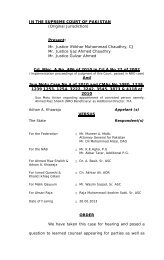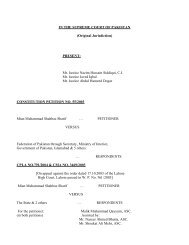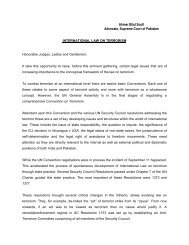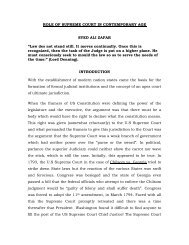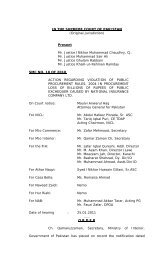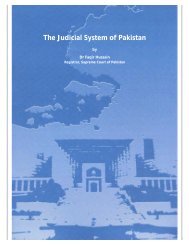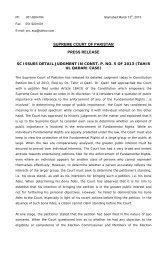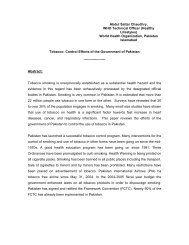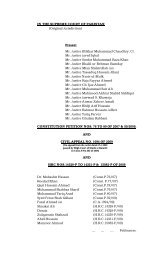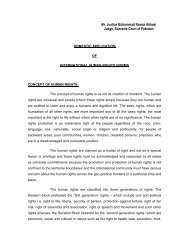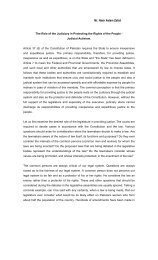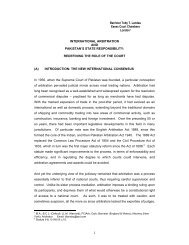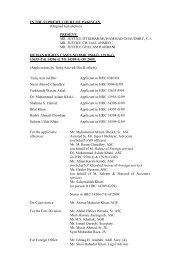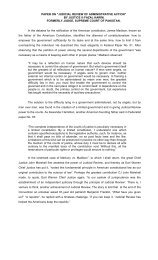mr. justice tassaduq hussain jillani mr. justice nasir-ul-mulk mr ...
mr. justice tassaduq hussain jillani mr. justice nasir-ul-mulk mr ...
mr. justice tassaduq hussain jillani mr. justice nasir-ul-mulk mr ...
Create successful ePaper yourself
Turn your PDF publications into a flip-book with our unique Google optimized e-Paper software.
CIVIL APPEAL NOs. 39/2010, 1150/2010, 1162/2010, 142-K/2009, 177-<br />
K/2010, 178-K/2010, 228-K/2010, 57-K/2011, 63-K/2011, 65-K/2011, 66-<br />
K/2011, 83-K/2011, 91-K/2011, 135-K/2011, 136-K/2011, 137-K/2011, 188-<br />
K/2011, 232-K/2011, 75-K/2012 AND 82-K/2012<br />
36<br />
section 10(2) of the Act is violative of any<br />
fundamental rights guaranteed by the<br />
Constitution, keeping in view the factum that to<br />
the absence of statutory provisions for reg<strong>ul</strong>ating<br />
the relationship of a statutory Corporation and its<br />
employees, the relationship is that of Master and<br />
Servant. We may also observe that subsections<br />
(2), (3) and (4) of section 10 of the Act have been<br />
omitted by the Pakistan International Airlines<br />
Corporation (Amendment) Act,. 1989 (Act No.V11<br />
of 1989), gazetted on 2-11-1989, and therefore,<br />
the above subsection (2) of section 10 is no longer<br />
on the statute.”<br />
37. The above r<strong>ul</strong>e of master and servant, it may however,<br />
be noted, was departed in situations where relationship between a<br />
corporation and its employees was reg<strong>ul</strong>ated by statutory<br />
provisions and violation of such provisions was complained of.<br />
Thus in Evacuee Trust Property Board v. Muhammad Nawaz (1983<br />
SCMR 1275), the Court upheld the judgment of the High Court by<br />
holding that, “Where statutory r<strong>ul</strong>es governed the service conditions<br />
of an employee, then the pleasure of the master stands surrendered<br />
to the extent the matter was covered by the relevant r<strong>ul</strong>es.”<br />
38. The afore-referred view was followed in Anwar Hussain<br />
v. Agric<strong>ul</strong>tural Development Bank of Pakistan (PLD 1984 SC 194)<br />
wherein this Court laid down as follows:-<br />
“The test of the employer/employee relation is the<br />
right of the employer to exercise control of the<br />
details and method of performing the work. It<br />
follows that if the relationship is the res<strong>ul</strong>t of a<br />
contract freely entered into by the contracting<br />
parties then the principle of Master and Servant<br />
will apply. The principle, however, will not apply<br />
if some law or statutory r<strong>ul</strong>e intervenes and<br />
places fetters upon the freedom of the parties in<br />
the matter of the terms of the contract. It is on this<br />
principle that a civil servant for whom there are<br />
constitutional safeguards, is not governed by the<br />
principle of Master and Servant; for he is<br />
possessed of a legal character for the



